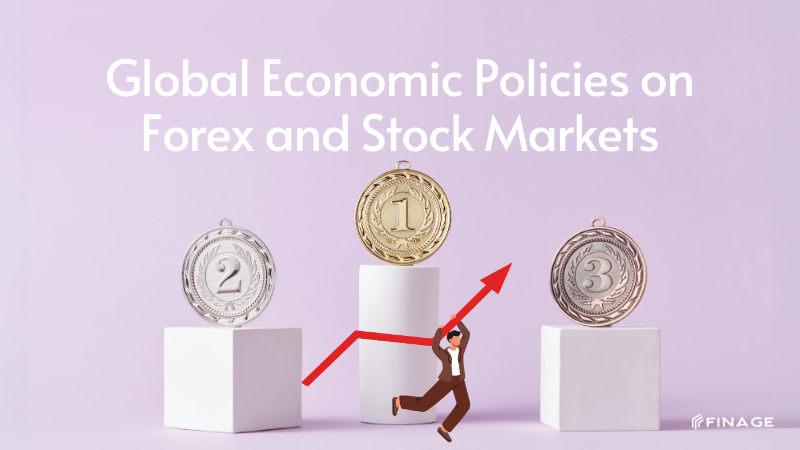
Global Economic Policies on Forex and Stock Markets
The stock markets are influenced by so many factors. International relationships between different countries can have a significant influence on market conditions as well as global economic policies and accordingly on the Forex and the future of the Stock Market and exchanges. Policies in place may either favor trades or limit investors. It is more so in the foreign exchange which depends heavily on global conditions.
Events that occur in a single country can not only affect its economic condition but also foreign investors. Any changes may mean a change in investor attitude which usually means less confidence in an economy. This will lead to further losses down the line. So are some of the policies that may affect trading?
Contents:
- Analyzing different context factors, trends, and developments
- Impact on sentiment and dynamics
- Global events
- Money supply
- Central bank
- Local economic changes: their impact on Forex niche
- Final thoughts
Analyzing different context factors, trends, and developments
Acknowledging the importance of many causes and events is crucial when getting into the world of stocks and FX, where also such factors as politics and financial changes play a significant part. Traders follow all political events closely and check all trends that occur in the newspapers and social media.
Any changes may quickly change the value of currencies. Any uncertainties may lead to a significant drop in currency which usually means losses for traders that fail to pick up the insight on time. For instance, the 2024 US election is predicted to boost the US dollar. Keeping those tiny and big details in mind that government policies will affect market values will help you to come up with more effective trading strategies.
Impact on sentiment and dynamics
Investors always monitor geopolitical conditions. Any uncertainties discourage traders from investing which may result in a drop in prices for stocks. Other factors that may play a role in forex include:
- Natural disasters
- Domestic policies
- Political turmoil
Global events
Global events can influence the foreign exchange market. Anything that may result in volatility will directly impact a currency. Conflicts between countries are examples of how political events play a huge role even in such areas as trading.
Governments have trade deals that are supposed to encourage exports and imports. This usually reduces the cost of exporting to another country, favoring the exchange of currencies. Signing a new deal or dissolving a previous one may impact the markets and the economy. Whenever there is tension in an area, it threatens trade deals.
Financial crises can quickly spread from one region to another. In today's tightly connected world, it is impossible to avoid the effects mostly of political/economic events and changes in one area on the local currency.
Money supply
The availability of a currency impacts its value. In cases of inflation, the central bank will try to regulate this. It increases interest rates. This is aimed at increasing the value of the local currency. Governments may also reduce restrictions on exports while limiting imports. A focus on exports restores the local value we compared to other currencies.
Positive trends and a rise in employment rates motivate more people to invest. Many traders may want to sell stocks before the value starts showing a downward trend. When reports and trends support a rise in value, investors will want to buy stocks.
Central bank
Central banks of most countries play a huge role in the value of currencies. They also regulate the value of stocks. Since the global financial crisis in 2008 and the recession that happened in 2022, many banks have always been alert to ensure that currencies are regulated.
They do this through various strategies. The things that they may adjust to prevent inflation include:
- Changing interest rates
- Raising the national reserve
- Reducing prices of imported goods
Local economic changes: their impact on Forex niche
These changes are typically aimed at the local economy. However, it may affect the Forex markets as well. That's because it is very interconnected and we can also see the Forex volatility and turbulence in the market. So it is impossible to expect changes in one country not to affect another.
Any measures put in place to regulate the currency may have an impact on investor attitudes. This affects day traders the most as they rely on regular changes to make decisions. When the economy is not performing well, the central bank may use strategies aimed at boosting the local currency. If the currency falls, it means exports will become more expensive, further plunging the currency to a lower position than its counterparts.
One way of staying ahead is by always being aware of which direction the central bank is taking. It allows you to plan when to maintain a position. You need insights into interest rates. Also looking at microeconomic conditions will provide better insight on what to expect.
Final thoughts
Forex could be a booming area to invest in today. The volatility that it comes with offers both advantages and challenges for investors. Governments are always looking for ways to regulate the local currency. So any changes such as economic or political instability will affect both Forex and Stock markets. Central banks may either increase or reduce interest rates. This affects the borrowing rates. It also influences the rate of foreign exports.
Day traders looking to join Forex should create a diverse portfolio. This will help them reduce risks. If one area fails, they may still make profits from other trades. Remaining agile and staying up to date with the latest trends in this highly volatile market reduces risks!
You can get your Real-Time and Historical Stocks Data with a Stock Data API key.
Build with us today!


